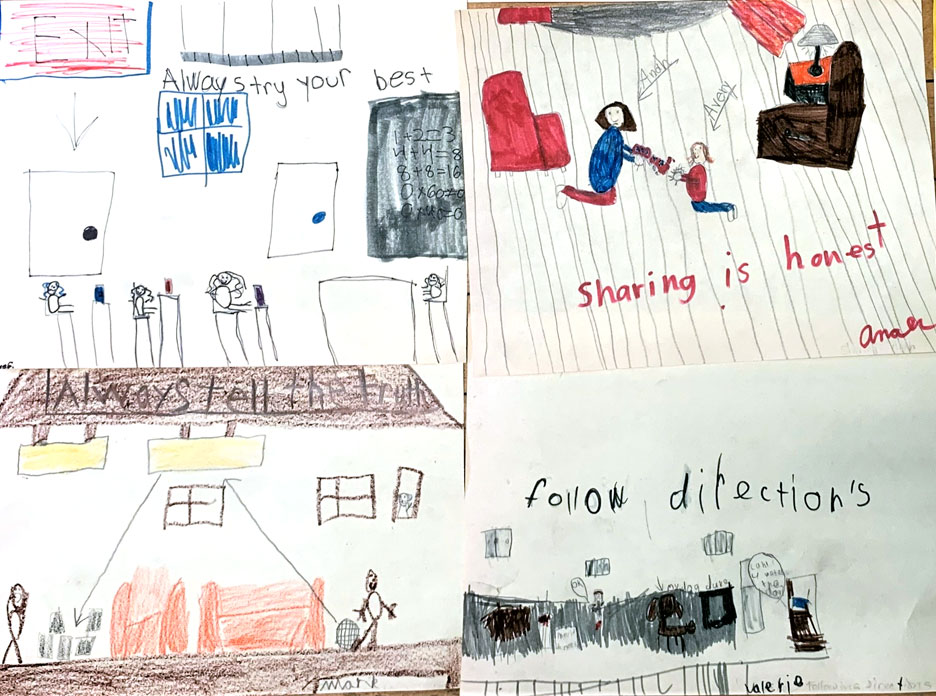Raising honest children

These are some St. Bernard’s School second-graders’ drawings of what honesty looks like to them.
St. Bernard’s School has a prayer service led by one of the kindergarten through fifth grades each Friday to crown the week. The fifth-grade students in Mrs. Danielle Fitzgerald’s class recently focused on the school’s monthly virtue of honesty.
In preparation, each student had drawn a picture of a situation where honesty served to protect the relationship of the persons involved. One student drew a picture of two people in a forest faced with a “No trespassing” sign, one saying, “OK, let’s go somewhere else.” In the student’s summarizing statement, he said, “We are being honest when we follow the rules. We need courage to be honest. We are honest when we tell the truth, even if other people don’t agree.”
Another depicted one person apologizing for taking a toy without asking permission, and just as importantly, the friend responding, “I forgive you.” While presenting, he said, “We should accept our mistakes and correct them. We should not take anything that doesn’t belong to us.”
A third student presented a quotation by Thomas Jefferson: “Honesty is the first chapter in the book of wisdom.”
These students are learning to admit when one is wrong, to do what is right even if it seems inconvenient, and to work toward being habitually honest. To be determined to act with honesty each day will make more bearable the habit of self-reflection at the end of the day. Self-respect will be the child’s inner expression of the world citizen he or she is becoming.
Arguably the most important virtue that we strive to instill in children from the earliest ages is honesty. Honesty is a prerequisite of trust and self-respect. It is the bedrock of our character development, and possibly of human society. While all virtues enhance our relationship with the world, honesty is the torchlight that serves to illuminate one’s best next thought, word and action. Children learn from explicit statements that they need to tell the truth and respect others’ property.
These times that demand so much of us can serve to motivate us to prepare the children best by helping them to develop habitual integrity. This quality of uprightness can carry them through challenging circumstances by giving them a sense of confidence in their ability to use good judgment, to avoid harming anyone, and to avoid regret and blame. One who has developed the habits of goodness in thought, speech and action is better prepared to act with fortitude in the face of adversity. This truth is expressed in Proverbs 22:6: “Train up a child in the way he should go, and when he is old he will not depart from it.”
In the second grade, teacher Mrs. Megan Czadzeck developed the students’ understanding of honesty by asking them to look at various situations from a positive point of view. After collecting ideas in list form, each student chose one of the aspects to depict in a drawing. So as the children eagerly drink in the lessons of life, every imperfect response to a situation is an opportunity to lovingly refine their understanding. Eventually they comprehend the reason for the adult’s emphasis on a preferred behavior. As a child’s comprehension grows, a world view based on ethical behavior will take shape. Through experience and over time, individuals learn that when one holds oneself to a high standard of behavior, it becomes possible to believe that others do, too.
When another group of children was asked what honesty means, 8-year-old Jake said, “It is when you don’t want to say you did something wrong, but you tell the truth anyway.” When asked to explain why, he said, “You have to because you can’t lie about it forever.” And why not? “Because,” he said, “it is wrong to lie, and you don’t want to keep being wrong.”
Children are always weaving the tapestry of their understanding with every fiber of their experience in every moment. Acknowledging social and emotional needs takes time. Teachers help children to process new lessons and to express new levels of understanding in relationships with peers and adults. The habits of honesty and thoughtful consideration are firmly planted in the hearts and minds of children only with the mutual trust that thrives in honest relationships entailing accountability in every individual’s words and actions.
Children are in constant need of adult oversight because they do not have the perspective born through years of experience that serve to help us keep some words unspoken, and to refrain from some actions. We must strive to empower the children to successfully meet the eventual complexities of their lives and world. Adults need to provide a model of excellence for their ever-evolving comprehension of the world and their wholesome participation in it.
—
Sylvia Hough is the family support coordinator for St. Bernard’s School in Saranac Lake.



